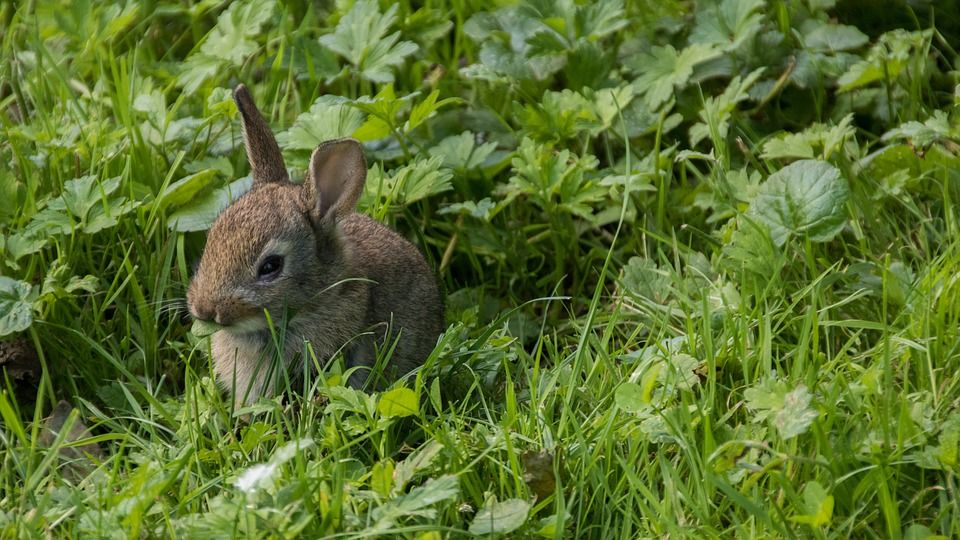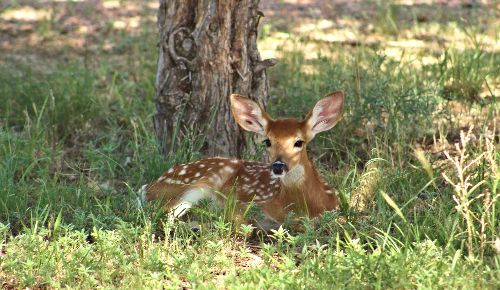
Published May 6, 2019
What to do When You Find Birds or Wildlife in Distress
Does that baby bird or rabbit in your yard really need rescuing?
“There are some things we can set the yearly clock by,” says Audubon refuge manager and naturalist Kim Calcagno. Each winter, she fields scores of phone calls about weak and emaciated water birds like Canada Geese, loons, grebes, and ducks. This past winter, the calls came through in the hundreds. But her work is far from over.
Throughout spring and summer, when people spot baby birds outside of their nests, Calcagno’s phone will light up again and again. Baby birds are often at the mercy of particularly persistent myths. Some people believe, for instance, that a baby bird cannot be reunited with its parents if it’s fallen out of a nest. But nothing could be further from the truth.
“Parent birds invest a lot of time and energy in their babies, and won’t give up on them easily,” Calcagno says. “Even if a storm destroys a nest, the parents fly around for days looking for their young. It’s easier than most people think to reunite baby birds with their parents.”
Most people don’t know that raising baby birds is highly specialized and demanding. Baby birds need to be fed every fifteen minutes from dawn until dusk. Calcagno, who has spent time rehabilitating baby birds, describes the experience as enough to make a person ill from exhaustion. When it comes to raising healthy nestlings, there is no replacement for devoted parents and a community of birds.
When it comes to situations where intervention is warranted however, choosing how and when to intervene can be complicated. There is no simple set of rules to follow. That’s why the Audubon Society of Rhode Island urges people to call an expert before trying to help a bird or animal that appears to be injured or orphaned. The truth is, a lot of supposed “rescue missions” carried out by non-experts are well intentioned but misguided, and ultimately harmful to wildlife. Sometimes it is helpful to intervene, but just as often, nature should be left to its own, at times unforgiving, ways.
An expert should always be consulted before intervening with wildlife.

Found an animal in distress?
Audubon offers expert advice on what to do.
- Before intervening in any way with an animal that appears to be injured or orphaned, monitor it from a distance and make some careful observations: What type of animal is it? If you’re unsure of the species, note the size, shape, and markings on the animal. Is it an adult or a baby? Where is it located? Did you see it moving? If it’s not moving, how long has it been in the same spot? Has anyone touched the animal? What obvious injuries do you see? If known, what is the reason for the injury?
- Call Audubon at (401) 949-5454 or the Rhode Island Wildlife Clinic at (401) 294-6363 for guidance before intervening. If no one is available to answer your call, visit www.riwildliferehab.org for helpful information or our “Ask Audubon” page.
- During normal hours of operation, injured animals may be brought to the Wildlife Clinic at 2865 Tower Hill Road (Route 1) in Saunderstown, R.I. Do not leave animals if the clinic is not open.
Please note that Audubon is not licensed to accept injured wildlife.
Answers to common questions are listed below.
A baby bird out of its nest, with no visible injuries: If the bird doesn’t have feathers and you can reach the nest, put it back. Your touch will not cause the mother to abandon the baby. If you can’t reach the nest, Calcagno advises tacking a small basket—like a pint-sized strawberry basket—to the tree, or as close to the nest as possible, and placing the baby bird gently in the basket. If the bird has feathers, leave it alone and monitor it. Juvenile birds that appear to be alone and incapable of flight are not necessarily injured or abandoned. A fledgling will hop around on the ground for a while before it learns to fly, and you may notice its parents coming around every 45 minutes or so to feed it. In the meantime, the best thing is to leave the bird alone and not attract the attention of predators to it.
An injured or orphaned raccoon, skunk, bat, fox, or woodchuck: Never touch these animals. Secure all pets indoors. Keep children away. These are rabies vector species. Call the Department of Environmental Management at (401) 222-3070 or your animal control officer. If a person has skin-to-fur contact with these animals, the person must be vaccinated and the animal must be euthanized.
A fawn alone in the bushes, or at the edge of the woods, calling out: Don’t attempt to move the fawn, and monitor it from at least 40 feet away. Note how long has the fawn been calling for its mother. A mother deer will leave her fawns to go off and forage. Since her babies are born without a scent, they may remain undetected and the mother expects to find them in the same place when she returns. If the fawn is up on its feet and running around, is visibly distressed or injured, or has been calling for a half-hour or more, call the Wildlife Clinic.
A rabbit nest that seems abandoned: It’s best to observe this nest from a distance and not draw attention to it. Chances are, that’s exactly what the mother of the young rabbits has in mind. She’ll only return to the nest briefly at dawn and at dusk. If she sat on the nest for any length of time, her presence would be a red flag to predators.
An orphaned baby squirrel, bird, or rabbit: Do not feed the animal or bring it into your home. Call the Wildlife Clinic or Audubon immediately. Mere hours can mean the difference between a relatively healthy baby animal and one that has suffered so much that it cannot be saved.

















